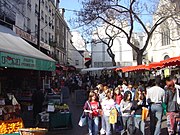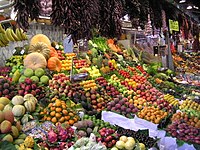Market
From Wikipedia, the free encyclopedia.

In general parlance, a market is a location where those willing to pay a price for something meet those willing to sell it. In marketing, a market is the sum total of potential buyers of a product.
In economics, a market is a mechanism which allows people to trade, normally governed by the theory of supply and demand, and thereby allocates resources through a price mechanism. It typically involves a bid and ask process.
Both general markets (where many commodities are traded) and specialised markets (where only one commodity is traded) exist. Markets work by placing many interested sellers in one "place", thus making them easier to find for prospective buyers. An economy which relies primarily on interactions between buyers and sellers to allocate resources is known as a market economy in contrast either to a command economy or to a non-market economy that is based, e.g., on gifts.
Contents |
Marketplaces and street markets
A marketplace is a location where goods and services are exchanged. The traditional market square is a city square where traders set up stalls and buyers browse the merchandise. This kind of market is very old, and countless such markets are still in operation around the whole world.
- In the USA such markets fell out of favor, but renewed interest in local food has cause the reinvention of this type of market, called farmers' markets, in many towns and cities.
- In continental Europe, especially in France, street markets, as well as "marketplaces" (covered places where merchants have stalls, but not entire stores) are commonplace. Both resellers and producers sell their wares to the public.
- Markets are often temporary, with stalls only present for one or two days a week ("market days"), however some (such as Camden Market in London, UK) are open every day of the week. Such markets are normally specialist—the various stalls of Camden Market, along with the shops associated with it, sell a variety of alternative lifestyle products ranging from clothes and jewellery to CDs, instruments and furniture. An example of a large market is Chatuchak weekend market in Bangkok.
The Roman term for market, still in use in a related sense, is forum. The modern shopping mall can be seen as an extension of this concept.
Wholesale markets
A wholesale market is a market which primarily sells to traders such as caterers and small shopkeepers, rather than to members of the public, although members of the public are not necessarily excluded. London, England has several centuries old wholesale markets such as Smithfield Market and Billingsgate Fish Market.
See also
Economic markets and marketspaces
In modern times, mainly after the invention of the electronic computer, markets are not always located in a physical space. Such virtual markets consist of communication paths where information exchange is easy and deals may be struck. These are often called marketspaces. A notable example of this is the international currency market. The e-Bay web site can also be considered a marketspace.





